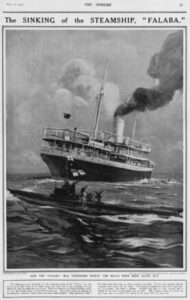 In any war, there must be a nation’s first casualty. World War I could be no different. On March 28, 1915, the first American citizen was killed in the eighth month of World War I. The United States didn’t even enter the war until April 6, 1917. Nevertheless, Leon Thrasher, who was a 31-year-old mining engineer and a native of Massachusetts, drowned when a German U-Boat, the U-28 torpedoed a cargo-passenger ship the British RMS Falaba, a West African steamship, on which Thrasher was a passenger. The sinking became known as “The Thrasher Incident.” The RMS Falaba was on its way from Liverpool to West Africa, off the coast of England. Of the 242 passengers and crew on board RMS Falaba, 104 drowned. Thrasher was employed on the Gold Coast in British West Africa, and on March 28, 1915, he was on the RMS Falaba, as a passenger, returning to his post, following a trip to England.
In any war, there must be a nation’s first casualty. World War I could be no different. On March 28, 1915, the first American citizen was killed in the eighth month of World War I. The United States didn’t even enter the war until April 6, 1917. Nevertheless, Leon Thrasher, who was a 31-year-old mining engineer and a native of Massachusetts, drowned when a German U-Boat, the U-28 torpedoed a cargo-passenger ship the British RMS Falaba, a West African steamship, on which Thrasher was a passenger. The sinking became known as “The Thrasher Incident.” The RMS Falaba was on its way from Liverpool to West Africa, off the coast of England. Of the 242 passengers and crew on board RMS Falaba, 104 drowned. Thrasher was employed on the Gold Coast in British West Africa, and on March 28, 1915, he was on the RMS Falaba, as a passenger, returning to his post, following a trip to England.
The sinking, brought with it a claim from the Germans that the submarine’s crew had  followed all protocol when approaching RMS Falaba. The Germans said that they gave the passengers ample time to abandon ship, and that they fired only when British torpedo destroyers began to approach to give aid to the Falaba. Of course, the British official press report of the incident disagreed, claiming that the Germans had acted improperly, “It is not true that sufficient time was given the passengers and the crew of this vessel to escape. The German submarine closed in on the Falaba, ascertained her name, signaled her to stop, and gave
followed all protocol when approaching RMS Falaba. The Germans said that they gave the passengers ample time to abandon ship, and that they fired only when British torpedo destroyers began to approach to give aid to the Falaba. Of course, the British official press report of the incident disagreed, claiming that the Germans had acted improperly, “It is not true that sufficient time was given the passengers and the crew of this vessel to escape. The German submarine closed in on the Falaba, ascertained her name, signaled her to stop, and gave  those on board five minutes to take to the boats. It would have been nothing short of a miracle if all the passengers and crew of a big liner had been able to take to their boats within the time allotted.”
those on board five minutes to take to the boats. It would have been nothing short of a miracle if all the passengers and crew of a big liner had been able to take to their boats within the time allotted.”
The sinking of RMS Falaba, and Thrasher’s subsequent death, was mentioned again in a memorandum sent by the US government, which was drafted by President Woodrow Wilson himself and addressed to the German government after the German submarine attack on the British passenger ship Lusitania on May 7, 1915, in which 1,201 people were drowned, including 128 Americans. President Wilson’s note was clearly a warning, calling for the US and Germany to come to a full and complete understanding as to the grave situation which had resulted from the German policy of unrestricted submarine warfare. In response to the warning, Germany abandoned the policy shortly thereafter. However, the policy abandonment was reversed in early 1917, and that was the final straw that put the United States into World War I on April 6, 1917.


Leave a Reply